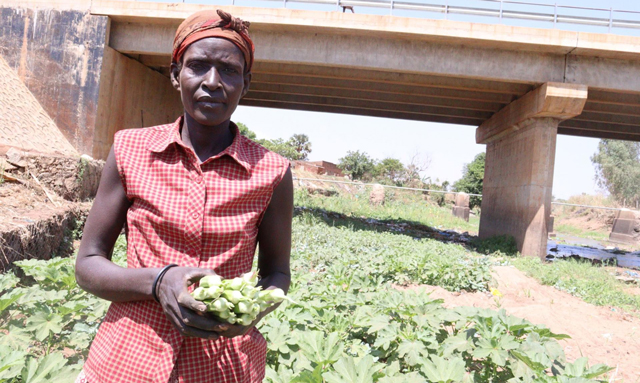
Kitgum, Uganda | THE INDEPENDENT | Women in Kitgum Municipality are reaping big from growing vegetables on the dry river bed.
Immaculate Atenyo a widow and resident of Kitgum Municipality owns no land and has not been able to rent any arable land for farming due to her inability to make enough money.
Atenyo who is a mother of two children says that over the years, she has been washing clothes for residents within the Municipality and occasionally supplements her income by selling vegetables in the main market.
But many years now in the same business, Atenyo says the income has been meagre and leaving her sometimes unable to support her family and rent their single room.
Last year in December, when the region began experiencing decreased rainfalls and consequently a dry spell, Atenyo saw an opportunity many hadn’t seen.
Pager River, one of the seasonal rivers in Kitgum District that snakes through Kitgum Municipality had begun drying up. The decrease in the river’s water level left a section of dry beds, along its bank in Central Division.
Atenyo wasted no time on this opportunity and begun clearing the dry land which had been filled with debris and garbage for farming.
“…The reason I came here during the dry season was that the land is near a river, I saw this from the Bantu who grow tomatoes here but later sell them at an expensive price to us. This inspired us, when I had just started, it wasn’t easy, but after clearing all the rubbish around, the vegetables started growing well…”
Atenyo says two months into growing okra, sukuma wiki [Collard Greens], and pumpkin, she is earning decently. Atenyo says that she now makes between 10,000 Shillings to 20,000 Shillings daily from the sell of vegetables in the market adding that she has been able to provide for the family and join a SACCO group to save money.
“…on a good day of sales, you can earn 20,000 shillings, but when there are many supplies of vegetables in the market, you may earn around 10,000 or 7,000 shillings which help a lot. This money is not wasted, we save it in a SACCO sometimes and the saving helps to pay school fees and health, and the balance helps to buy books for the children” Despite making gains from farming freely on the river bed, Atenyo is worried that by April, she will be displaced from her venture as the river takes up its boundary owing to the return of the rains.
She has appealed to the local authorities to consider supporting vulnerable elderly women with space for farming to improve their livelihood. Atenyo is not the only woman utilizing free space for growing vegetables.
Miriam Ataro, another widow has been farming on Pager river bed for the past years.
Ataro who also grows collard greens, cabbages and okra says she uses the dry river bed every dry season which has helped her to save enough money for her five-year-old son and eight-year-old daughter’s school fees.
She however says the business is seasonal adding that whenever rain starts, she is forced to abandon the site to resume buying green vegetables from wholesalers.
Ataro is also anticipating renting land to continue farming but notes that it’s expensive.
She is however proud that through utilizing the dry river bed for farming, she has helped to expose an area that formerly was a haven for thugs during the day and night hours.
Both women don’t pay any money to Central Division to rent the space they are farming on.
But Geoffrey Toolit, the Central Division Chairperson says the practice is illegal adding that they are only allowing them to cultivate on a humane ground since the women are vulnerable.
Toolit says whereas the division can support the women to boost their farming out of the river bed, they ought to first consult them so as their plans if deemed feasible can be captured for consideration in the coming budget.
“We are in the budget cycle and this means that if we are to help these women continue farming out of the river bed, they should bring for us their plans. It’s possible that the Division can allocate for them a water pump to boost their farming at a different site,” Toolit says.
Kitgum District Production officer Alfred Omony says dry river bed farming is profitable since the production is done off season when vegetables are scarce and prices are high leaving farmers with a high-profit margin.
He however says there is limitation to promoting the farming style due to the law against farming in wetlands. Omony says there are possibilities that sometimes farmers can resort to use fertilizers and chemicals to boost the growth of crops and kill pests, which in-turn pose threats to aquatic lives.
Whereas river bed farming is seen as a sustainable way of enhancing production by landless and vulnerable individuals on underutilized arable land, the practice is less common within the region and largely remains illegal.
********
URN
 The Independent Uganda: You get the Truth we Pay the Price
The Independent Uganda: You get the Truth we Pay the Price



